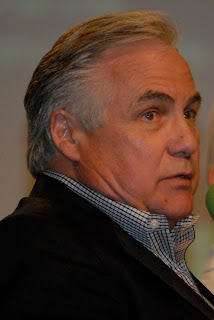
Assembly Member Jim Patterson on Water
Storage is Critically Needed
State Assembly member Jim Patterson represents the 23rd district, which encompasses eastern Fresno County and part of eastern Tulare County. His comments on what needs to be done regarding California water for agriculture and urban use were made at the recent Water Summit in Fresno.
 |
| Jim Patterson, 23rd Assemblyman |
I am new to the Assembly, in “sponge-mode”/listening mode and attempting to understand what we can and cannot achieve in the short-term and long-term. So what I have been trying to do is to set a framework in which I can be engaged and supportive of the water bond in 2014. And my hope is that the Senate democratic leadership will be as clear as possible with respect to the principles that the 2014 bond is going to put forward.
So there are a few principles that I will be looking for:
Principle number one is, if we are going to pass the statewide water bond, it has to create net new water. It’s not good enough, merely, to rearrange the deck chairs on the Titanic.
We continue to fight over a stagnant water supply. I think we must pay attention to the wet-year runoffs, and that means storage. That means we capture it, store it, and save it, and we use it during the dry years.
When I was mayor for eight years, two of every four years were wet years. I took a look from a helicopter ride over Millerton Lake in 1997, and I saw hundreds of thousands of acre-feet flow out the Bay. I think we need to have a net, new water bond that actually gets us more of a water supply.
Secondly, the water bond absolutely has to contain storage. We live in Central California where we can look up to our mountains and we can see the benefits of hydrology that comes from the Kings River Watershed and the San Joaquin River Watershed.
We need to modernize our historic hydrology. I think there are too many people in Sacramento who want to essentially ignore the fact that we have good dams, we have hydrological systems, and they have served us exceedingly well. Not only do we get water, we get flood control, potable water, agricultural water, recreation and inexpensive energy.
Those are all strong cases to be made for storage. There are quite a number of dams that are up to capacity and others in the supply chain.
For the water policy in the long term, I think Central California has to ensure that we retain the water rights along our watersheds—the San Joaquin and Kings Rivers. I don’t think it does us any good to have a water policy that starts to begin to move our water supply to other places and to other people, because of the highest bidder. We can’t be exporting water out of our watersheds.
Whatever policy, long-term, has to incorporate net new water storage and conveyance, particularly during the wet years for use in dry ones. We have to protect our water rights; we can’t give those away in negotiations.
Finally, in the short-term, I am a little frustrated. I’ve been here for a while, and it seems we have lot of other folks are looking at our watch and telling us what time it is. And the watch is broken, and we ask them, “Can you please fix the watch?” And they tell us that they can’t.
So, in the short term, with all due respect for those who seem they cannot do anything, folks, I don’t know what the answer is on the federal level. We have to continue to encourage those people we send to Washington, D.C. and get those pumps turned on now.
There has to be a databased, fact-based, information-based approach to this that can convince those in Washington to act now. You send 800-000 acre-feet out the Bay, as it happened just last year, and for what? Because there were a little more than 300 smelt discovered in the pumps? To me, that is insanity, and the effects of it are huge.
You talk about being in a crisis; those 800,000 acre-feet of water would serve 100,000 people, irrigate 200,000 acres and employ thousands. And yet, we have the Endangered Species Act, biological findings and activity by our federal government that I can only conclude is dictatorial. And we have got to be consistently pressing those who beat us that it is not good enough for them to just say, “We are working on it; we are trying to fix it.”
I know it is easy for me as a member of the Assembly and a freshman, to say to the federal water officials, ‘”Please, you’ve got to do something.” But I want to commend those on the Panel today and those in Congress, that we have a Senate we have got to deal with, and we need to be encouraging Dianne Feinstein, Barbara Boxer and others because good things are developed in Congress, only to have them shot down in the Senate.
And while all that goes on, 800,000 acre-feet get sent out—over some smelt.
I think the major stressor is how The Endangered Species Act has been excessively and absolutely improperly used to penalize us downstream for what is going on upstream.
We have predation issues, predators are eating the smelt, and we get blamed for it.
State Assembly member Henry Perea said to revisit the stressors. Absolutely, and the fact is that Sacramento and Stockton are putting sewage into the river, and the ammonium levels are rising, and yet we are the ones at the end of the water flow who have to give up 800,000 acre-feet.








